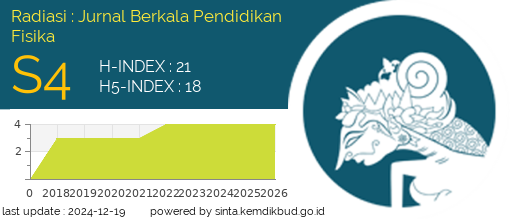Profil Proses Berpikir Siswa dalam Mengolah Informasi yang Disajikan Melalui Alat Peraga Laboratorium
Abstract
Abstract – Laboratory demonstration tools is learning medium that teachers use as an alternative to improve students’ understanding. Founded that students understand the concept that is taught but some students still have difficulty in solving the problem. This study aims to describe the profile of students' thinking processes presented through laboratory equipment by analyzing student behavior as learning takes place based on information processing theory. This research is a naturalistic qualitative research in which the research takes place naturally and not conditioned. Subjects in this study were 2 students of SMKN in Salatiga with high and low academic category. The result of the students' thinking process descriptions show that subjects with high academic categories are able to process the stimuli in selective attention more fully from subjects with low academic categories, the two subjects perform a perception process against the stimulus correctly, the rehearsal process performed by subjects with high academic categories stimuli more frequently than subjects with low academic categories, subjects with high academic category are able to perform the encoding process well while the subject with low academic category were not, and subjects with high academic category can perform the process of retrieval smoothly while subjects with academic low category have difficulty difficulties. The lack ability to process information can decrease the ability to solve problems. The suggestion for educators is that they must provide a complete record of learning outcomes and provide conceptual application for learning objectives to be achieved.
Downloads
References
Gagne, R. M. 1985. The Condition of Learning Theory of Instruction. New York: Rinehart and Winston. Inc
Hill, W. F. 2009. Theories of Learning. Bandung: Penerbit Nusa Media.
Milles, M.B., & Huberman, M.A. (1984). Qualitative data analysis. London: Sage Publication.
Schunk, D. H. 2012. Learning Theories an Educational Perpective. Yogyakarta: Pustaka Pelajar
Sugiyono. 2010. Metode Penelitian Pendidikan. Bandung: Alfabeta.
Amamah, Syifa’ul. dkk. 2016. Proses Berpikir Siswa SMP Bergaya Kognitif Field Dependent dalam Menyelesaikan Masalah Berdasarkan Teori Pemrosesan Informasi. Universitas Negeri Malang: Jurnal Pendidikan.
Gubrin, T. 2015. Enlivening The Machinist Perspective: Humanising The Information Processing Theory with Social Cultural Influences. Procedia Social and Behavior Science.
Prasetyarini, A. dkk. 2013. Pemanfaatan Alat Peraga IPA Untuk Peningkatan Pemahaman Konsep Fisika Pada Siswa SMP Negeri 1 Buluspesantren Kebumen Tahun Pelajaran 2012/2013. Universitas Muhamadiyah Purworejo: Jurnal Pendidikan.
Hidayati, Ni’matul. 2018. Analisa Proses Berpikir Siswa dalam Menyelesaikan Masalah Matematika Berdasarkan Teori Pemrosesan Informasi. Universitas Islam Negeri Sunan Ampel Surabaya: Skripsi.
Sugiman. 2005. Kontruktivisme melalui pendekatan realistik dalam pengajaran matematika matematika. Seminar Nasional Pengembangan MIPA di Era Globalisasi. Yogyakarta: JICA-IMSTEP-U




